Thinking about making Ethiopia your new home, or simply curious about what it costs to live there? You’re in the right place! This guide breaks down essential expenses to help you understand the financial landscape of living in Ethiopia.
In recent years, Ethiopia has been drawing more and more expats, thanks to its rich culture, history, and relatively affordable cost of living. But what does affordable really mean in this context? Let’s dig deep into housing, food, transportation, and entertainment to give you a clear picture.
Housing and Utilities
When it comes to finding a place to live in Ethiopia, one of the first things you’ll notice is the variety of housing options available, which can fit different budgets and lifestyles. If you're planning to settle in a major city like Addis Ababa, you might find that the cost is relatively higher compared to smaller towns. Rent for a one-bedroom apartment in the city center could range from $300 to $600 per month. On the other hand, outside the city center, prices may drop to around $200 to $400 per month.
For those looking to buy a property, prices can vary significantly depending on the location and type of property. In prime city areas, property prices might be as high as $2,500 per square meter, while in suburban areas, you can expect to pay about $1,000 per square meter. These prices make Ethiopia a relatively affordable place to both rent and buy homes, especially when compared to many Western countries.
Let’s talk about utilities, which include electricity, water, garbage collection, and internet. For an average-sized apartment, expect to pay around $50 to $100 per month for these basic utilities. However, electricity in Ethiopia can be unpredictable, with occasional outages during certain seasons. Having a backup generator could be a practical solution to avoid disruptions.
“Electricity supply in Ethiopia is prone to occasional interruptions, especially during the rainy season. Many residents invest in backup generators to prevent inconvenience,” says Alemu Tadele, a local housing expert.
When it comes to internet services, prices and speeds can vastly differ. A basic internet package with speeds around 10 Mbps can cost approximately $30 to $50 per month. For faster and more reliable connections, particularly for work-from-home setups, you may need to spend between $70 and $100 per month.
In terms of additional expenses, don’t forget about the cost of maintaining your home. Minor repairs and regular maintenance can add an extra $40 to $70 to your monthly budget. For those who prefer a more hands-off approach, hiring household help is also quite affordable, with full-time domestic workers typically earning between $100 and $200 per month.
In summary, while there are costs associated with housing and utilities in Ethiopia, with careful planning and budgeting, it’s possible to live comfortably without breaking the bank. Whether you choose to rent or buy, similar costs might make urban living slightly more expensive but still manageable and worthwhile given the vibrant and rich culture that cities like Addis Ababa have to offer.
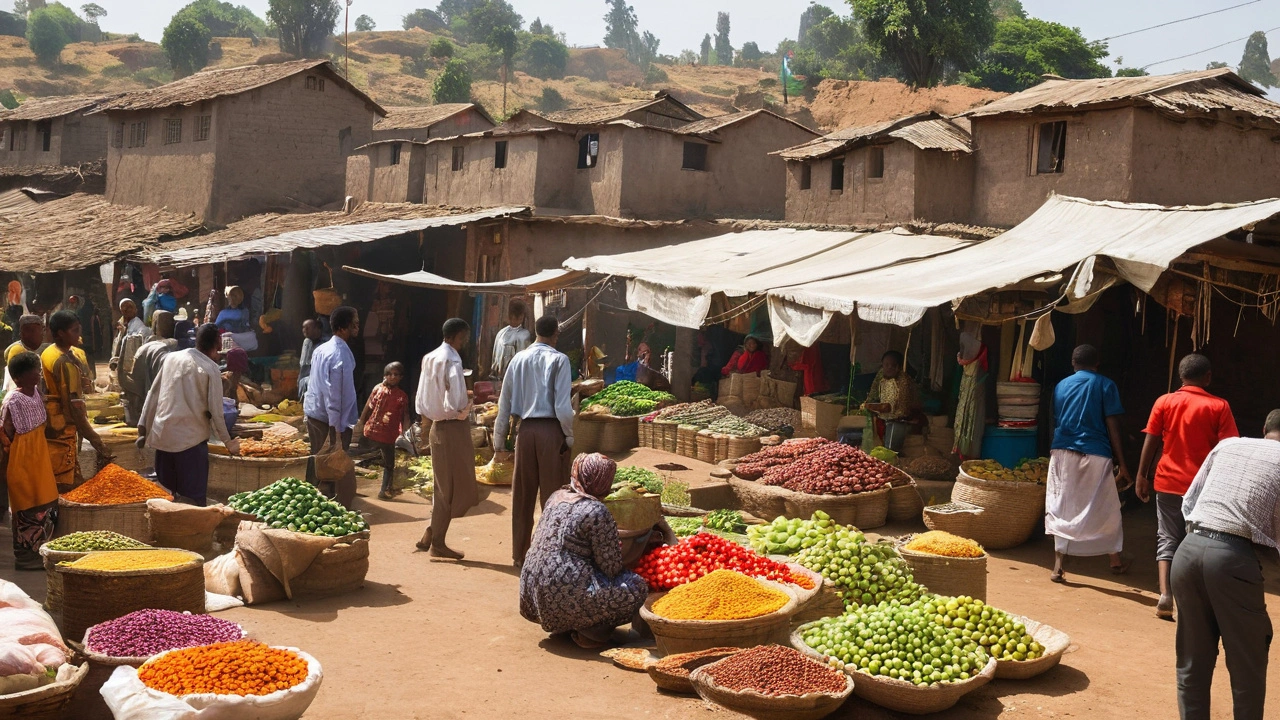
Food and Groceries
One of the first things you need to understand about living in Ethiopia is the cost and culture surrounding food. If you love to cook at home, you'll find local markets a delight. Fresh produce is incredibly cheap compared to Western countries. Vegetables like tomatoes, onions, and carrots can be bought for just a few birr, the local currency. Meat, especially chicken and beef, is also quite affordable and readily available at local butchers and supermarkets.
Eating out is an experience in itself. You can enjoy local dishes like injera and doro wat at a very reasonable price. Street food is popular and often costs less than $1 for a hearty meal. Restaurants cater to a variety of tastes and budgets. Western-style dishes are available, but they can be pricier compared to traditional Ethiopian meals. That being said, even high-end dining is cheaper in Ethiopia than in many Western countries.
If you're concerned about the variety of groceries, supermarkets in Addis Ababa and other major cities stock international products. Dairy products and imported goods can be more expensive, but there's usually a good selection. Organic and health-conscious choices are also growing. Local fruits and vegetables are not only inexpensive but rich in flavor and nutrients.
An interesting fact is that Ethiopia is the birthplace of coffee, and locals take their coffee-drinking seriously. The traditional coffee ceremony is an integral part of life, and you can enjoy some of the world's best coffee for a fraction of what you pay at a global coffee chain. A cup of freshly brewed Ethiopian coffee costs around $0.50 to $1.
Here's a pro tip: bargaining is a common practice in local markets, so don't hesitate to negotiate prices. It’s part of the culture and can help you save even more.
"Ethiopians cherish their coffee deeply. It's not just about drinking; it's a social ritual that bonds families and communities," says Dr. Getachew Asfaw, a cultural anthropologist.
Focus on buying fresh produce from local markets, it's healthier and cheaper compared to supermarkets. And if you're new to Ethiopian cuisine, take time to explore and enjoy the rich variety of dishes. With a bit of practice, you’ll master the art of finding high-quality ingredients without straining your budget.
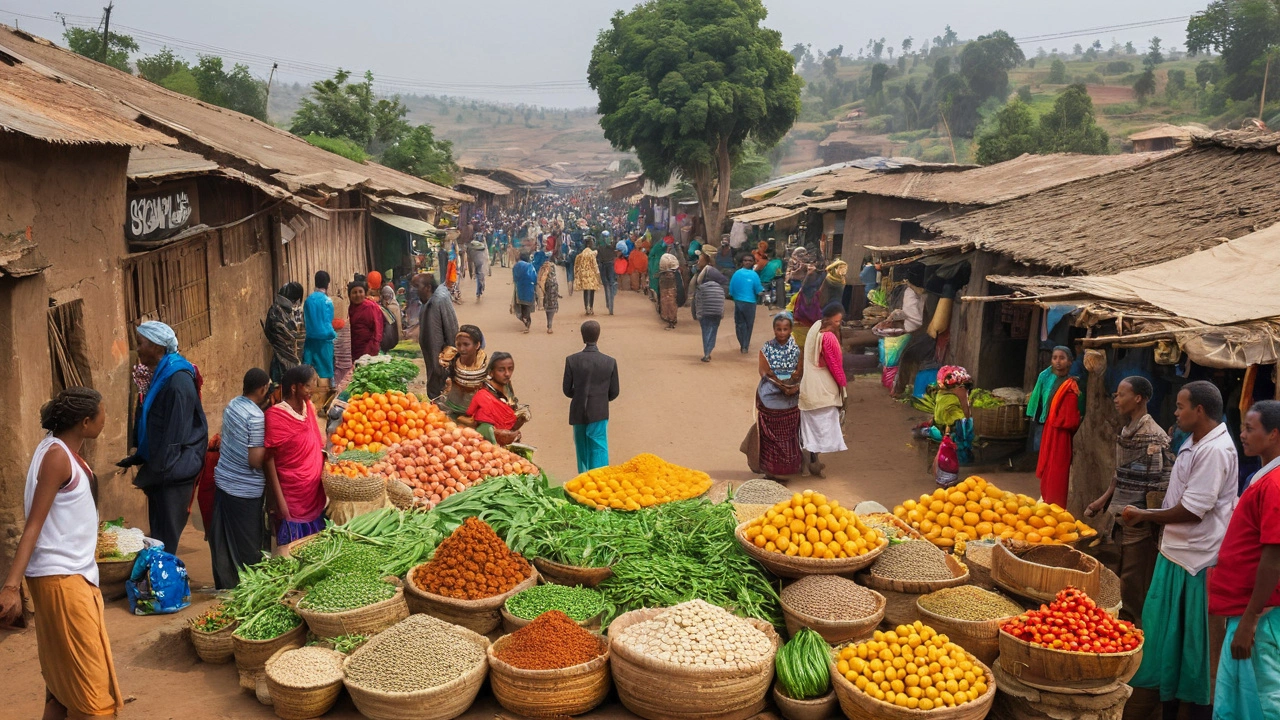
Transportation
Getting around in Ethiopia can be an adventure in itself. Public transportation options are diverse and can range from the very affordable to moderately pricey. One of the most popular methods of public transportation in the capital, Addis Ababa, is the Blue Donkey, locally known as 'blue donkeys' or blue taxis. These are minibusses that operate like shared taxis, picking up and dropping off passengers along a set route. They are incredibly cheap, often costing less than a dollar for most trips within the city.
Addis Ababa also boasts a light rail system, which is the first of its kind in sub-Saharan Africa. The light rail serves as a convenient means to navigate the sprawling city. Tickets for the light rail are reasonably priced, making it a preferred option for both locals and expatriates. A ride on the rail usually costs between $0.25 and $0.50, making it an economical choice.
"Transportation in Ethiopia is evolving rapidly. The introduction of the light rail system marks a significant milestone for the country's infrastructure," says Daniel Tessema, an urban development expert.
If you’re looking to travel between cities, you can choose long-distance buses. These buses are quite affordable, but be prepared for long travel times and sometimes unpredictable schedules. The buses are generally safe, but comfort levels can vary. For those who prefer a quicker, albeit more expensive option, domestic flights are available and connecting major cities. Ethiopian Airlines, the national carrier, provides an extensive network of domestic flights. While tickets can cost between $50 and $100, flying is undoubtedly the fastest way to cover large distances.
Private car hire is another possibility for those who prefer their own space. Hiring a driver with a car can add convenience and flexibility to your travels. Prices vary, but on average, you could expect to pay around $50 to $70 per day for a car and driver. Fuel prices are relatively low in Ethiopia compared to western countries, which makes driving a more viable option for those planning to stay longer. That said, driving in urban areas like Addis Ababa can be chaotic with unmarked roads, aggressive driving habits, and unexpected obstacles.
Bicycles are increasingly becoming popular, especially in smaller cities and rural areas. They offer a cost-effective and eco-friendly means of transport. In recent years, efforts have been made to improve cycling infrastructure, though it’s not yet at par with Western standards. Still, for short distances, cycling can be a delightful way to explore and get around.
For expats and longer-term residents, understanding local transportation customs and etiquette is key. In Blue Donkey taxis, it's customary to pass the fare hand-to-hand to the driver via other passengers when seated at the back. Learning phrases in Amharic, like 'dekama' (stop here), will also make your journey smoother. Locals are usually accommodating towards foreigners, and a smile goes a long way in making connections.
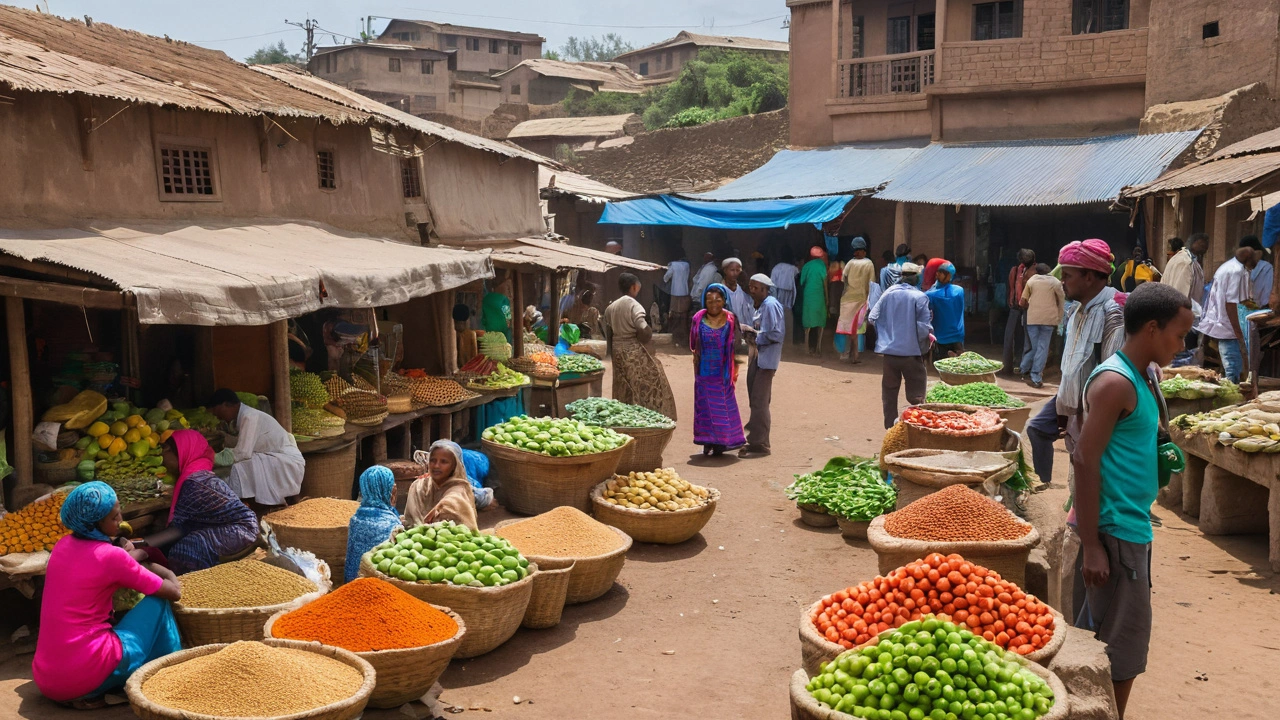
Entertainment and Lifestyle
When it comes to entertainment and lifestyle in Ethiopia, you’ll find a vibrant and diverse array of options that cater to different tastes and budgets. From the bustling cities of Addis Ababa and Mekelle to the serene landscapes of the Omo Valley, there’s always something interesting to explore.
In the heart of Addis Ababa, you'll find numerous venues offering live music, ranging from traditional Ethiopian jazz to contemporary international hits. Fendika, a cultural center in the Kazanchis area, hosts nightly performances that showcase the rich heritage of Ethiopian dance and music. These shows are not only entertaining but affordable, with tickets usually costing just a few dollars.
For movie enthusiasts, theaters in major cities screen both international blockbusters and local Ethiopian films. Edna Mall in Addis houses a popular cinema complex where tickets for the latest releases are cheaper compared to Western countries. If you prefer staying in, streaming services like Netflix and Amazon Prime are accessible, ensuring you won’t miss out on your favorite shows and movies.
“Ethiopia offers a cultural kaleidoscope, from its traditional coffee ceremonies to its vibrant nightlife. It's an experience that's both affordable and enriching,” according to travel writer Bradt Guides.
The country’s culinary scene is another highlight. Food aficionados can indulge in a variety of dining experiences, from small local eateries, known as 'bunna bets,' to upscale restaurants offering international cuisines. A meal at a local spot might set you back just a couple of dollars, while dining at a high-end establishment will cost significantly more but still cheaper than in many Western nations.
Ethiopia also caters well to outdoor enthusiasts. The Simien Mountains offer spectacular hiking trails, and the Danakil Depression provides a glimpse into one of the most geologically active regions on Earth. Entrance fees to national parks are reasonable, making it accessible for most visitors to enjoy these natural wonders.
Shopping in Ethiopia is an adventure in itself. Markets like Merkato in Addis Ababa, one of Africa’s largest, provide a unique shopping experience. From handmade crafts to spices and textiles, you’ll find treasures without breaking the bank. Modern shopping centers like Century Mall offer a more conventional retail experience, blending international brands with local stores.
For those who love to socialize, there’s no shortage of cafes and bars. Coffee culture is hugely significant in Ethiopia, being the birthplace of coffee. Traditional coffee ceremonies are a must-try, and many cafes offer this unique experience. Bars and nightclubs in the cities offer another layer of nightlife, with many places staying open late into the night.
Joining social clubs or taking part in community events can also enrich your life in Ethiopia. Expats often find clubs dedicated to expatriates as spaces to build friendships and engage in various leisure activities. Whether your interests lie in sports, arts, or volunteer work, there’s likely a group suited to you.
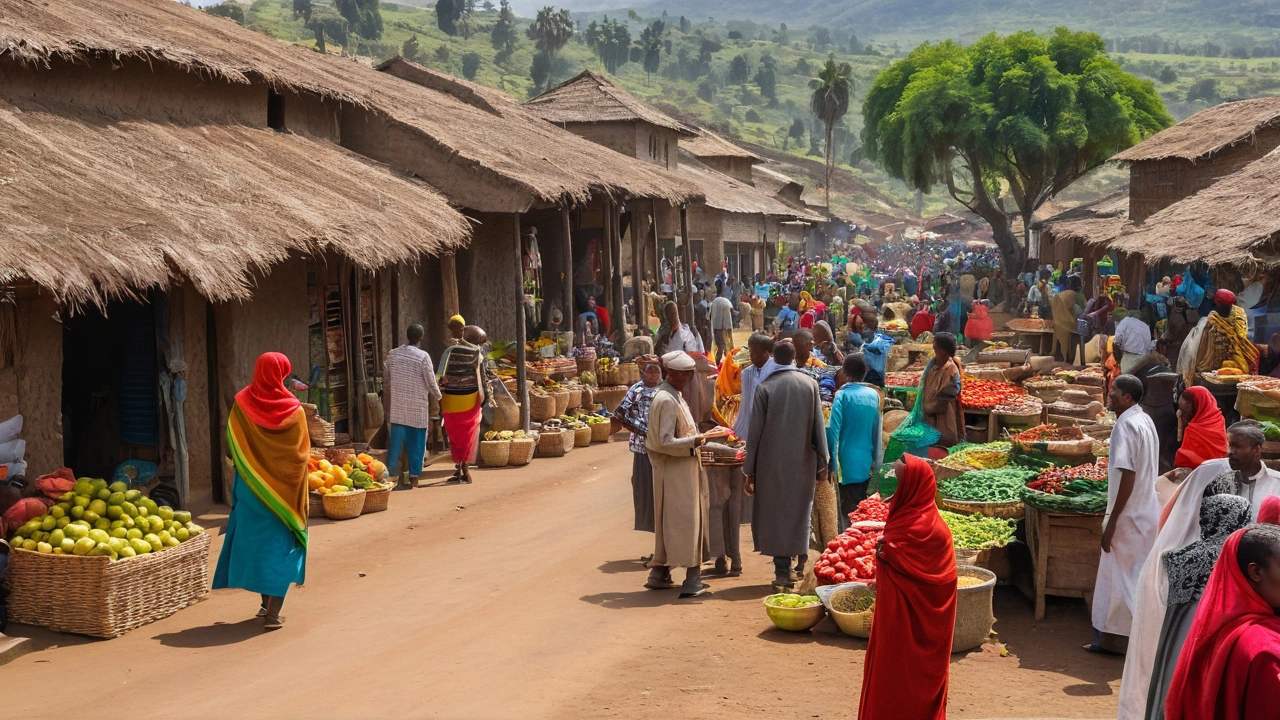
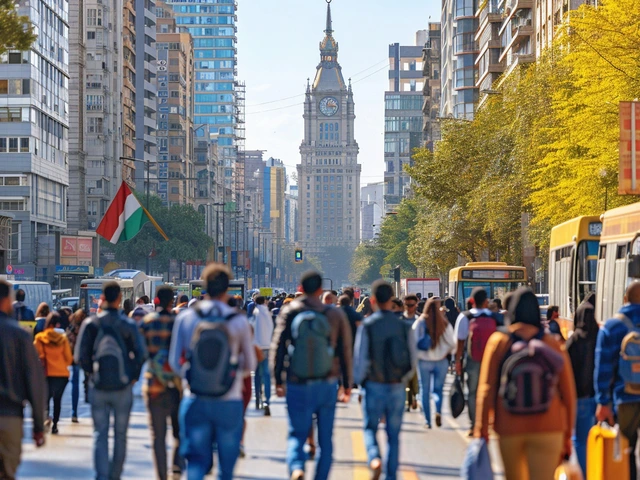 Understanding Taxation in Ethiopia: Do Ethiopians Pay Taxes?
Understanding Taxation in Ethiopia: Do Ethiopians Pay Taxes?
 Exploring Career Opportunities in Ethiopian Industries
Exploring Career Opportunities in Ethiopian Industries
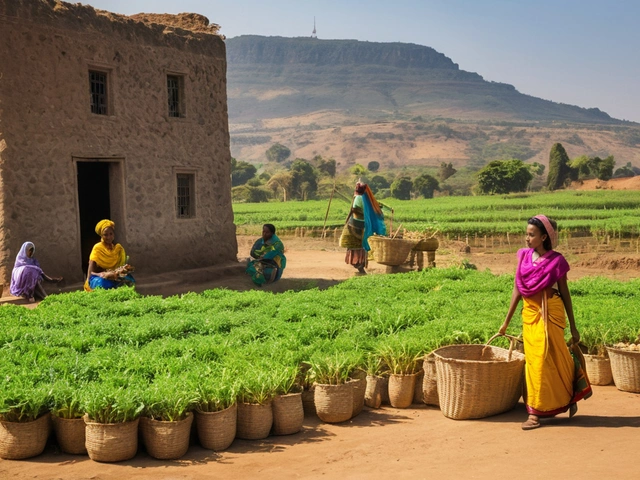 Ethiopian Jobs: Exploring Livelihoods in Ethiopia
Ethiopian Jobs: Exploring Livelihoods in Ethiopia
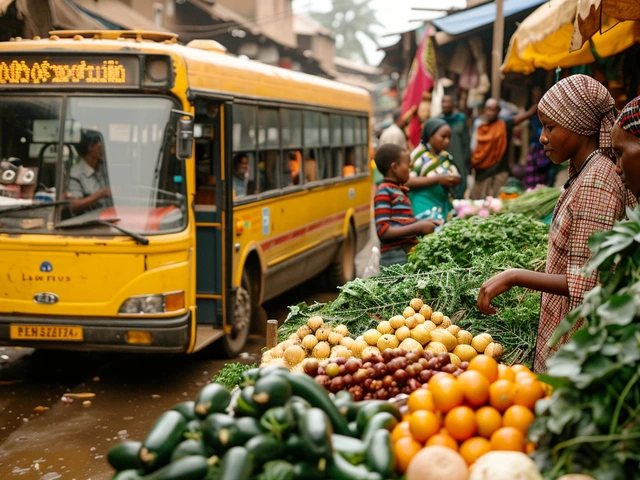 Living Comfortably in Ethiopia: How Much Money Do You Really Need?
Living Comfortably in Ethiopia: How Much Money Do You Really Need?
 5 Booming Careers You Should Consider for a Bright Future
5 Booming Careers You Should Consider for a Bright Future
christine mae cotejo
August 2, 2024 AT 17:33Stepping onto the bustling streets of Addis Ababa for the first time feels like opening a vivid storybook, each page drenched in the aroma of freshly roasted coffee and the rhythmic clatter of market stalls; the cost of living here, while modest compared to Western metropolises, unfurls layers of nuance that deserve a thorough exploration. First, consider housing: a one‑bedroom apartment in the city centre can range from $300 to $600, yet venturing slightly beyond the urban core drops that figure to a more palatable $200‑$400, a difference that can fund countless coffees or weekend trips to the highlands. Utilities, while generally affordable at $50‑$100, come with the occasional surprise of power outages, prompting many locals to invest in backup generators-an extra but sometimes necessary expense. Internet connectivity varies wildly; a basic 10 Mbps package sits at $30‑$50, whereas a reliable, faster service for remote work can climb to $70‑$100, a cost that many expats deem essential. Food markets burst with fresh produce that can be bought for a few birr per kilogram, making home‑cooked meals dramatically cheaper than dining out, where a traditional injera and wat might cost just a couple of dollars. Street food vendors, ever‑present, serve hearty meals for under $1, offering a culinary adventure without denting your wallet. On the transportation front, the iconic Blue Donkey minibusses glide through the city for less than a dollar per ride, while the light rail offers an even cheaper alternative at $0.25‑$50 per trip, both embodying the city’s spirit of affordable mobility. For longer journeys, long‑distance buses provide budget‑friendly connectivity between cities, though patience is required for their often unpredictable schedules; meanwhile, Ethiopian Airlines’ domestic flights, though pricier at $50‑$100, deliver speed and comfort when time becomes a luxury. Entertainment, too, thrives on modest budgets: live music venues like Fendika charge a few dollars for an immersive cultural experience, and cinema tickets remain well below Western prices, ensuring that nightlife doesn’t break the bank. Outdoor enthusiasts can trek the Simien Mountains or explore the otherworldly Danakil Depression, with park entrance fees that are surprisingly reasonable, allowing nature lovers to satisfy their wanderlust without overspending. Lastly, the vibrant markets such as Merkato provide endless opportunities for unique souvenirs, handmade crafts, and local textiles, all at prices that reward diligent haggling. In sum, while Ethiopia’s cost of living demands mindful budgeting, the country rewards frugality with rich cultural experiences, affordable comforts, and a community that embraces newcomers with open arms and steaming cups of coffee.
Douglas Gnesda
August 2, 2024 AT 17:53The macro‑economic landscape in Ethiopia supports a relatively low cost base, but it's essential to calibrate your financial model with localized variables such as seasonal electricity fluctuations and the tiered pricing of internet service providers; leveraging a bundled utility plan can often shave 10‑15% off your monthly outlay, especially if you combine water and electricity under a single provider. Moreover, when factoring in housing, a pragmatic strategy involves targeting neighborhoods just outside the downtown corridor, where rent can be negotiated down by up to 30% while still offering reasonable commute times via the Blue Donkey network.
Abhijit Pimpale
August 2, 2024 AT 18:10Utilities average $75/month; internet packages start at $30.
Eric DE FONDAUMIERE
August 2, 2024 AT 18:13Yo, if u got a roommate split the rent you can def save big bucks! Also, dont forget to check out those promo internet deals they run every few months.
Pauline Herrin
August 2, 2024 AT 18:26While the guide offers a comprehensive overview, it glosses over the volatility of fuel prices, which can significantly affect transportation costs, particularly for those considering private vehicle use.
Sherri Gassaway
August 2, 2024 AT 18:30One might ponder whether the price of a cup of coffee truly measures the value of a culture, for in Ethiopia, each sip is a ritual that transcends mere monetary exchange, inviting us to contemplate the deeper currents of community and tradition.
Milo Cado
August 2, 2024 AT 18:43Great summary! 👍
MONA RAMIDI
August 2, 2024 AT 18:46Honestly, this guide feels like a sugar‑coated brochure-skip the fluff.
grace riehman
August 2, 2024 AT 19:00hey guys, just wanted to add that if u really wanna stretch ur budget, hit up the local farmer markets early in the mornin'-prices are the lowest and the vibe is super friendly!